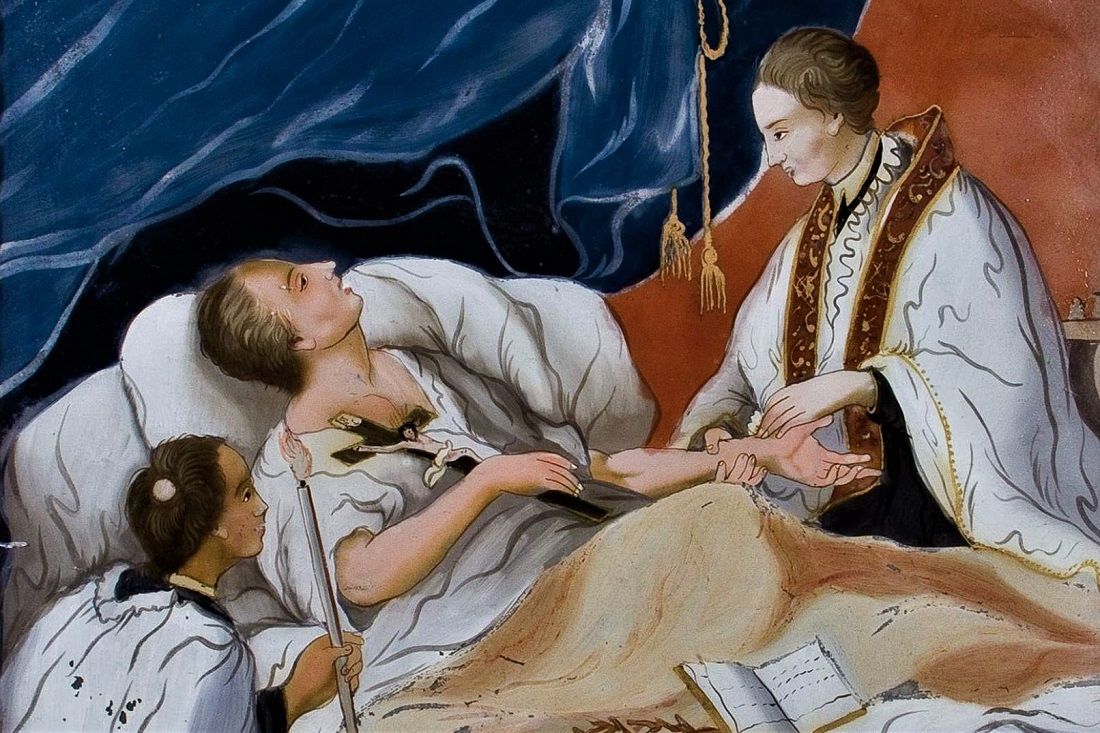Anointing of the sick sanctifies the journeying disciple in his weakest moment, reinvigorating hope for healing and ushering in the kingdom of God. Anointing of the sick configures the ill to Christ's passion, inaugurates the glorification of the body and spirit in the resurrection, and rejoins the marginalized into the Body of Christ.
Anointing of the sick confronts human finitude and asserts our total dependence on God for healing. In the sacrament, God hears the cry of his people[1] and rushes towards them in their pain, revealing his nuptial love.[2] The grace of the sacrament strengthens the sick man in his obedience to God, inviting him to trust in God with his whole life[3] and surrender to healing on God's terms.[4] Anointing of the sick calls the ill to freely unite himself to the passion and death of Christ[5] by living out the Paschal mystery through his particular suffering as a witness to the cross, with hope in the resurrection. Anointing bestows new meaning on suffering[6] without justifying the incoherence of evil. God recasts our purpose for existence[7] and intimately deepens our relationship with him, conforming us to his Son who willingly suffered and died for us.[8] Anointing joins our pain to Christ's and transforms our suffering into a Eucharistic sacrifice of love.[9]
Through anointing of the sick, the person of Jesus manifests divine solidarity with human brokenness and God's glory in human wholeness.[10] In hope of the Good News, we submit ourselves to his total care. Through the sacraments, Christ continues to touch his people.[11] Oil marks our head and hands, blessing the means by which we encounter God's action in the world and redeeming the sites of both sin and suffering. Christ consecrates our broken bodies into tabernacles for God's goodness.[12] Through his very healing works, Christ announces the radical healing[13] to come in the resurrection. Christ inaugurates the kingdom of God, where in fullness our bodies will not only be cured[14] but also inconceivably glorified.[15] The physical graces of anointing of the sick serve as eschatological signs of God's covenantal promise[16] fulfilled in the resurrection of all flesh.[17] In the sacrament, the dawn of Easter pervades illness.[18] Anointing bestows the gift of the Holy Spirit to renew faith and trust in God, strengthening both body and soul and rectifying our unbelief.[19] In anointing of the sick, God raises us up in his love and cultivates our disposition of thanksgiving.[20]
Anointing reintegrates the ill into the communion of saints, as Christ rushes to their bedsides through his Church.[21] Anointing overcomes the alienation of illness[22] by uniting the Body of Christ in the prayer of intercession[23] for the whole health of the Body. The Church hastens to the margins of society, continuing Christ's ministry of compassion and mercy.[24] In the sacrament, the Church reclaims the ill as her own, providing strength and support. Whereas in reconciliation, God's mercy bends down in forgiveness, in anointing, God's mercy bends down in loving acceptance of his afflicted.[25] This acceptance forgives the sins of the sick and frees the whole Body to forgive one another in their particular relationships, reconstituting group membership and forging new communal bonds.[26] Christ redefines the boundaries of human interaction.[27] Our dependence on God, as acknowledged in prayer, is practiced in our dependence on the Body.[28]
In anointing of the sick, Christ takes us into his hands through the Church, blesses us with his Spirit, remains with us in our brokenness, and gives us in communion with his paschal sacrifice. Through the grace of the sacrament and the company of the Church, Christ gives courage to the afraid, patience to the afflicted, hope to the dejected, and support to the lonely.[29]
Featured Image: Krankensalbung (aus einem Satz von sieben Hinterglasbildern mit den heiligen Sakramenten), Gege Workshop, late 19th c.; Source: Wikimedia Commons, PD-Old-100.
[1] Exodus 2:23-24. "The Israelites groaned under their bondage and cried out, and from their bondage their cry for help went up to God. God heard their moaning and God was mindful of his covenant with Abraham, Isaac, and Jacob." Throughout salvation history, God listens to his people in their suffering with compassion.
[2] In marriage, the couples vow to one another "in sickness and in health". The marriage between Christ and the Church recalls God's covenant of complete self-gift with Abraham.
[3] Luke 9:23. "Whoever loses his life for my sake, he will save it." This is the aqedah of Abraham (Genesis 22): the handing of one's entire self over to God so that by partaking in relationship with God, we will be remembered in the resurrection.
[4] Job 38: 2. "Who is this who darkens counsel with words of ignorance?" When Job cries out against unjust suffering, God reveals that the horrific wonders of the world are not for us to understand or control. Instead, we are called to trust in God's merciful providence.
[5] Catholic Church, Catechism of the Catholic Church (Vatican: Libreria Editrice Vaticana. 2000), §1522. "By the grace of this sacrament the sick person receives the strength and the gift of uniting himself more closely to Christ's Passion: in a certain way he is consecrated to bear fruit by configuration to the Savior's redemptive Passion."
[6] Ibid. "Suffering, a consequence of original sin, acquires a new meaning; it becomes a participation in the saving work of Jesus." Suffering is given meaning because it is shared in Christ's saving action and offered as a gift to the Church.
[7] 2 Corinthians 12:9. "My grace is sufficient for you, for my power is made perfect in weakness." Suddenly, God's grace is made manifest through our very brokenness.
[8] Bruce Morrill, Divine Worship and Human Healing (Collegeville, MN: Liturgical Press. 2009), 70. "Solidarity in human suffering is the revelation of divine love."
[9] Colossians 1:24 "In my flesh, I complete what is lacking in Christ's afflictions for the sake of his Body, that is, the Church." Our own afflictions are bound to the cross and taken up in Christ's perfect sacrifice.
[10] Bruce Morrill, op. cit., 95.
[11] Matthew 14:36. "People brought all the sick to Him, and begged Him just to let them touch the fringe of His cloak. And all who touched Him were healed."
[12] Deuteronomy 6:4-11. "Hear, O Israel! The Lord is our God, the Lord alone! Therefore, you shall love the Lord, your God, with your whole heart, and with your whole being, and with your whole strength. Take to heart these words which I command you today. Keep repeating them to your children. Recite them when you are at home and when you are away, when you lie down and when you get up. Bind them on your arm as a sign and let them be as a pendant on your forehead. Write them on the doorposts of your houses and on your gates." Even in illness our bodies remain temples for worship and capable of glorifying God.
[13] Bruce Morrill, op. cit., 69. "Do not permit the offense of the miracle story to replace the offense of the Gospel—the scandal of the cross and the mystery of the resurrection." All experiences of curative healing should point towards the even greater wonder of Christ's salvific act in the passion and resurrection.
[14] Matthew 11:5. "The blind receive sight, the lame walk, the lepers are cleansed, the deaf hear, the dead are raised, and the good news is preached to the poor."
[15] Charles Gusmer, And You Visited Me: Sacramental Ministry to the Sick and the Dying (New York, NY: Pueblo Publishing Company. 1984), 150. Christ cures and goes beyond the cure: "The blind see his glory, the deaf hear the good news, the lame walk with Christ." Christ does not just cure, but he converts us in healing us to a deeper fullness than we even know we need.
[16] The same God of Abraham, Isaac, and Jacob—the God of salvation history who liberated the Israelites from Egypt—will raise us up from evil eternally in the eschaton.
[17] 1 Corinthians 15:21-23. "For since death came through a human being, the resurrection of the dead came also through a human being. For just as in Adam all die, so too in Christ shall all be brought to life, but each one in proper order."
[18] John 10:10. "The thief comes only to steal and kill and destroy. I have come that they may have life, and may have it abundantly." Christ came not only to endure suffering, but also to build the kingdom of goodness and health.
[19] Mark 9:24. "I do believe, help my unbelief!" In healing us body and soul, Christ also heals our fear and doubt, assisting us in faith.
[20] Luke 17:16. "And then, one of them, realizing he had been healed, returned, glorifying God in a loud voice, and he fell at the feet of Jesus and thanked him." As demonstrated by the healed leper who returned to thank Christ, our own healing is consummated in our praise and thanksgiving of God's salvific goodness.
[21] Charles Gusmer, op. cit., 154. "Jesus's ministry to the sick is continued in His Body: the Church."
[22] Matthew 27:46. "Abba, abba, why have you forsaken me?" The experience of isolation from community invokes Christ's abandonment on the cross.
[23] Karl Rahner, Meditations on the Sacraments (Munich, Germany: Verlag Ars Sacra Joseph Mueller. 1974.), 89. "Nevertheless we are surrounded by the invisible and silent company of all who, in circumstances like our own, have accepted the will of God, of all who have found eternal life in this life and death of ours, and who have allowed themselves to be wholly absorbed into this mystery which softly and silently detaches us from ourselves." Even in the solemn silence that penetrates the prayers and articulated intentions of the sacrament, there is a communion that persists among believers—a solidarity in the human condition.
[24] Mark 6:12-13. "So they went out and preached that men should repent. And they cast out many demons, and anointed with oil many that were sick and healed them." Anointing of the sick is part of the apostolic mission of the Church who carries out Christ's work on earth.
[25] Christ repetitively heals the greatest outcasts in society: the lepers, the blind, the poor, the crippled, the uncleanly, and the possessed.
[26] Bruce Morrill, op. cit., 98.
[27] Matthew 9:20. "A woman suffering hemorrhages for twelve years came up behind him and touched the tassel on his cloak." Christ receives a gesture in love that should have been received as defaming, according to societal constraints, and thus he rewrites the boundaries of communion.
[28] Matthew 9:2. "And there, people brought to him a paralytic lying on a stretcher." The ill rely on their brethren to bring them to Christ, and so, all parts of the body rely on one another in their journey towards God.
[29] Catholic Church, The Rites of the Catholic Church as revised by the Second Vatican Ecumenical Council, Vol 1 (Collegeville, MN: Liturgical Press. 1990), 825. "When he/she is afraid, give him courage, when afflicted, give him patience, when dejected, afford him hope, when alone, assure him of the support of your holy people."

